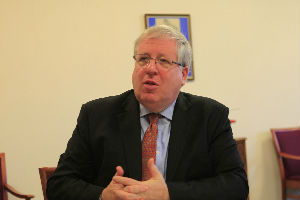Vice-premier calls for strengthened EU ties
Updated: 2013-10-25 00:08
By Fu Jing and Tuo Yannan in Brussels, and Li Jiabao in Beijing (China Daily)
|
|||||||||||
China and the European Union must work together as they pursue structural reforms, Vice-Premier Ma Kai said.
Their cooperation is crucial as the Chinese economy began to pick up in the third quarter and the EU economy showed signs of recovery.
China is willing to work with a "candid, pragmatic and cooperative" attitude to advance relations, Ma said.
He was chairing the fourth High-Level Economic and Trade Dialogue in Brussels on Thursday, a preparatory session for the China-EU leaders summit next month.
It is expected negotiations will be launched on a long-awaited investment pact at the summit.
Before the meeting, Olli Rehn, European Commission vice-president, said the EU and China represent around a third of global GDP and both economies are in the process of important structural reforms.
"In an increasingly interconnected world we need to understand each other's perspectives and problems if we are to provide an effective, cooperative response to current challenges and promote strong, sustainable and balanced growth in the EU, China and globally," Rehn said.
EU Trade Commissioner Karel De Gucht said trade ties are at the heart of the relationship. "But as the interdependence of our two economies increases, tensions can arise," said De Gucht.
Cui Hongjian, director of European studies at the China Institute of International Studies, said the dialogue is necessary in view of new problems in China-EU economic ties, which are undergoing structural changes.
"The dialogue provides a chance for both sides to talk," Cui said. "The trade dispute on solar products reflects differences in thinking — China insists on negotiations while the EU prefers judicial ways."
Fredrik Erixon, director of the European Centre for International Political Economy, said economic relations are generally developing smoothly, with trade and investment expanding quickly in the past 10 years.
"There is great potential for expanding economic integration between Europe and China in the future. So in real terms I think it's a relationship which is going in a good direction," Erixon said.
Paul De Grauwe, head of the European Institute of London School of Economics and Political Science, said China and the EU can cooperate in shaping global governance because it is natural for rising powers such as China to have a say in the system.
"This is good for China, good for Europe and good for the world economy. I think we need more competition in the global financial and monetary system," said De Grauwe.
De Grauwe said there is not much that established powers like the EU, Japan and the United States can do to oppose the situation. "They should welcome this."
Giles Merritt, secretary-general of Friends of Europe, said China and the EU should look at the global context.
"We should be sitting down with the Chinese and also with others and (asking them) what exactly do you want, such as do you think there should be a new IMF, do you have other views on the governance structure of World Bank?" Merritt said.
Contact the writer at fujing@chinadaily.com.cn
Li Xiaofei contributed to this story.
Related Stories
Chengdu to hold EU-China cooperation fair 2013-10-24 10:19
Tour of China 2013 brings EU and China closer 2013-10-18 13:08
Toward a new EU-China citizen diplomacy 2013-10-18 08:55
Currency swap signed with the EU a 'landmark' 2013-10-11 07:20
China, EU agree 45b euro currency swap 2013-10-10 17:39
'EU signal needed' for investment agreement 2013-09-28 08:59
Today's Top News
Vice-premier calls for strengthened EU ties
Beijing discusses ban on idling motor vehicles
Ban to help protect kids from sexual predators
Returnees are 'seed capital' for startups
Samsung's response fails to satisfy users
EU asked to ease visa restrictions
PMI heads for 7-month high
Growing row to eclipse EU summit
Hot Topics
Lunar probe , China growth forecasts, Emission rules get tougher, China seen through 'colored lens', International board,
Editor's Picks

|

|

|

|

|

|





